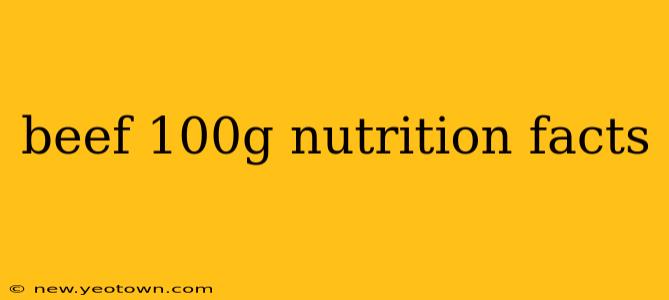Unpacking the Nutritional Powerhouse: A Deep Dive into 100g of Beef
Let's be honest, a juicy steak or a flavorful burger is a culinary experience many of us crave. But beyond the deliciousness, what's truly in that 100g of beef? Understanding the nutritional profile of beef isn't just about calorie counting; it's about appreciating the complex balance of nutrients this versatile food offers. This detailed exploration will delve into the nutritional facts of 100g of beef, answering your burning questions along the way.
It's important to note that the exact nutritional content of 100g of beef varies significantly depending on several factors: the cut of beef (lean sirloin versus fatty ribeye, for instance), the animal's diet, and the cooking method. This analysis will provide a general overview based on average values for a standard cut of beef.
What are the macronutrients in 100g of beef?
A typical 100g serving of lean beef offers a significant amount of protein, a moderate amount of fat, and negligible carbohydrates. This makes it a cornerstone of many high-protein diets.
-
Protein: Lean beef is an excellent source of high-quality protein, crucial for building and repairing tissues, supporting immune function, and maintaining overall health. You can expect around 25-30 grams of protein in 100g of lean beef.
-
Fat: The fat content varies greatly depending on the cut. Leaner cuts like sirloin will have significantly less fat than richer cuts like ribeye. The fat content contributes to the flavor and texture but also adds to the overall calorie count. A 100g serving of lean beef might contain anywhere from 5-20 grams of fat, while fatty cuts could exceed this considerably.
-
Carbohydrates: Beef is naturally very low in carbohydrates, typically containing less than 1 gram per 100g serving.
What are the micronutrients in 100g of beef?
Beyond the macronutrients, beef is a surprising source of several essential micronutrients:
-
Iron: Beef is a rich source of heme iron, a form of iron that's easily absorbed by the body. This is particularly important for preventing iron-deficiency anemia.
-
Zinc: Another vital mineral, zinc plays a crucial role in immune function, wound healing, and cell growth.
-
Vitamin B12: This vitamin is essential for nerve function, red blood cell formation, and DNA synthesis. Beef is an excellent source of Vitamin B12, especially important for vegetarians and vegans who may struggle to obtain adequate amounts from other sources.
-
Niacin (Vitamin B3): Important for energy metabolism and maintaining healthy skin.
-
Selenium: An antioxidant mineral that plays a role in thyroid function and protecting against cell damage.
How many calories are in 100g of beef?
The calorie count of 100g of beef is highly dependent on the fat content. Leaner cuts will fall in the range of 150-200 calories, while fattier cuts can easily exceed 300 calories.
Is beef high in cholesterol?
Yes, beef does contain cholesterol, but the impact of dietary cholesterol on blood cholesterol levels is a complex and often debated topic. While it's true that beef contains cholesterol, it's crucial to consider the overall dietary pattern. Focusing on lean cuts and maintaining a balanced diet is key to managing cholesterol levels.
What are the potential health risks associated with consuming beef?
While beef offers many nutritional benefits, it's important to be mindful of potential drawbacks.
-
Saturated Fat: Higher fat cuts of beef contain significant amounts of saturated fat, which can contribute to high cholesterol and heart disease if consumed excessively.
-
Sodium: Processed beef products often contain high levels of sodium, potentially leading to high blood pressure in susceptible individuals.
-
Potential for Foodborne Illness: Proper handling and cooking of beef are essential to prevent foodborne illnesses.
Conclusion:
100g of beef provides a concentrated source of high-quality protein, essential vitamins and minerals. However, mindful consumption is key. Choosing lean cuts, controlling portion sizes, and balancing beef consumption within a broader healthy eating pattern is crucial to reap its nutritional benefits while minimizing potential risks. Remember to consult with a healthcare professional or registered dietitian for personalized dietary advice.

